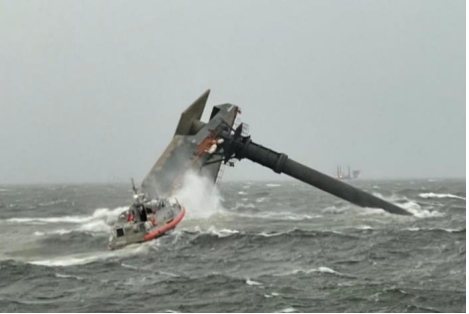In our public board meeting yesterday, we found that severe winds during a thunderstorm led to a loss of stability and ultimately the capsizing of the liftboat Seacor Power off the coast of Port Fourchon, La., on April 13, 2021. Of the 19 people aboard the vessel, six died and seven are missing, presumed dead. Six people were rescued by the U.S. Coast Guard and other vessels. The Seacor Power, valued at $25 million, was a total loss.
The NTSB determined the probable cause of the capsizing of the Seacor Power was a loss of stability that occurred when the vessel was struck by severe thunderstorm winds, which exceeded the vessel’s operational wind speed limits. Contributing to the loss of life on the vessel were the speed at which the vessel capsized and the angle at which it came to rest, which made egress difficult and the high winds and seas in the aftermath of the capsizing, which hampered rescue efforts.
NTSB investigators identified data gaps that prevented the National Weather Service (NWS) from identifying and forecasting the surface wind magnitudes that the Seacor Power encountered. The localized wind conditions could not be detected by weather service radars due to their elevation angles. As a result, the NTSB recommended the NWS, Federal Aviation Administration, and the Air Force work together to assess coastal weather radar sites to determine if it is safe and appropriate to lower radar angles, which could improve the ability to accurately forecast weather conditions.
The NTSB issued three safety recommendations to the U.S. Coast Guard: develop procedures to inform mariners in affected areas whenever there is an outage at a navigational telex broadcasting site; modify restricted-service liftboat stability regulations to require greater stability for newly constructed restricted-service liftboats; and develop procedures to integrate commercial, municipal, and non-profit air rescue providers into sectors’ and districts’ mass rescue operations plans.
The NTSB also reiterated a recommendation to the U.S. Coast Guard to require all personnel employed on vessels in coastal, Great Lakes and ocean service be provided with a personal locator beacon (PLB).
The NTSB also recommended the Offshore Marine Service Association notify members of PLB availability and value. The first time the NTSB recommended the Coast Guard require PLBs was following the 2015 sinking of the cargo vessel El Faro in which all 33 crewmembers perished.
The NTSB reiterated the recommendation for the first time after the fishing vessel Scandies Rose sank off Sutwik Island, Alaska, in 2019, which killed five people; and again following the 2020 sinking of the Emmy Rose fishing vessel off the coast of Massachusetts, which killed all four crewmembers.




